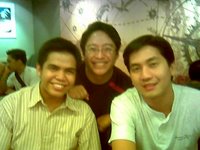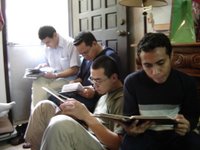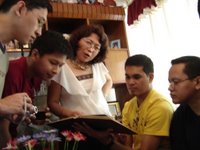21 March 2006: Tuesday in the 3rd Week of Lent
Matthew 18, 21-35: On ForgivenessNote:I have two homilies on forgiveness using the same Gospel passage. Open the Archives to October 2005. There are two parts.Part I: Kapatawaran: On Forgiveness dated 4 September 2005, 23rd Sunday in Ordinary Time
Part II: Stages in Forgiveness dated 11 September 2005, 24th Sunday in Ordinary Time
Part I describes forgiveness, Part II tackles how we can forgive.
Below are prayers for reconciliation. Use whatever helps.
Prayer for Granting Forgiveness to Myself
My God, You who perpetually pardon all who are sincere in their sorrow, help me as I seek to forgive myself.
I realize, my Lord, that unless I can forgive myself I cannot fully forgive those who have offended me.
Humble my heart so that I can embrace all that is hidden within me.
You, Lord of Creation, have divided time into day and night. My life is likewise divided between light and darkness, good and bad.
When these dark, negative needs are excessive and out of balance with the positive, they become destructive to others, and to myself as well.
I forgive myself for becoming impatient because I was too busy, too particular, or in a hurry.
I forgive myself for this failing as I forgive others who are impatient too.
I forgive myself for making mistakes, for being too quick to act or to speak, for not taking time to think; I forgive myself as well as others who make their own mistakes.
I forgive myself for being stupid in sinning, for falling into the same errors which injure others and myself.
I forgive myself for all those small sins that irritate others and cause me shame.
For a smallness of mind in my thoughts, for a narrowness of heart in my actions, I forgive myself and forgive others who act and think as I do.
Compassionate Lord, I know how I sin most easily; help me to understand and to correct this failing.
A pause for silent reflection may be used here.
I grant myself pardon and forgiveness so that my darkness may fuel the goodness within me, a goodness which You, my God, have placed in great deposit within me. Amen.
Prayer for One about to Approach Another for Pardon
Come, Lord of Healing and Unity, I am in need of Your divine assistance.
I need to approach another and to find a way to peace and understanding.
We are now separated, and the canyon between us is painful and empty of You.
Help me to be honest as I seek reunion.
Open to my vision the ways by which I have failed and have been lacking in consideration.
Let my heart be ready to see how I have sinned.
I will need Your help so that I may move beyond my own feelings to an awareness of the other who is also suffering.
You, Searcher of Hearts, know how both of us in our own ways are at fault.
Teach us to be humble as we seek reunion.
Come and stand between us so that all we say and do will be filled with the sacred medicine of heaven.
Remind us how short our lives are so that we will not delay this reunion of hearts.
Inspire us to see how this separation can serve to bring us even closer together, closer than we were before it happened.
Most of all, Lord of Compassion, let me be a servant of pardon, a minister of reconciliation, as I now pray for Your holy guidance.
Pause for silent prayer.
Lord, Divine Parent, make me a humble and healing as our mother the earth.
Make me as honest and defenseless as a child.
Make me a compassionate and loving as Your Son, Jesus.
And, Lord of Giver of True Strength, make me as forgiving as You are. Amen.








